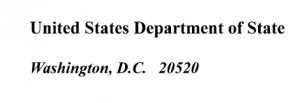BIOGRAPHIES
Anita Chan is the Program Officer for the Fulbright programs in China, Hong Kong, Macau, Mongolia and Taiwan in the East Asia and Pacific Branch of the U.S. Department of State’s Bureau of Educational and Cultural Affairs (ECA). Prior to joining ECA, she worked at the U.S. Embassy in Beijing, China and has over 10 years of non-profit experience focused on youth and community development. She holds an MBA from Fordham University specializing in Entrepreneurship and Strategy and a bachelor’s degree in Business Management from the State University of New York at Buffalo.
Victoria Chan is a Junior Program Officer for the Fulbright East Asia and Pacific Branch in the U.S. Department of State’s Bureau of Educational and Cultural Affairs (ECA). Prior to joining ECA, she worked in international student admissions at the George Washington University and taught English to Speakers of Other Languages both in the United States and Taiwan. She holds a master’s degree in International Education from the George Washington University and a bachelor’s degree in English Language Arts from Hunter College City University of New York.
William Brent Christensen assumed the role of AIT Director in summer 2018. Mr. Christensen has been in the United States Foreign Service for more than 29 years and has extensive experience in senior positions relating to Taiwan and China. Mr. Christensen was Deputy Director of the American Institute in Taiwan’s Taipei office. Prior to that, he was Director of the State Department’s Office of Taiwan Coordination, where he had a primary role in formulating U.S. policy toward Taiwan. He has served three assignments at the U.S. Embassy in Beijing, the most recent being Environment, Science, Technology and Health Counselor. Mr. Christensen has also served as a Senior Level Career Development Advisor in the State Department’s Human Resources Bureau. Prior to that assignment, he served as the Foreign Policy Advisor at the Asia-Pacific Center for Security Studies (APCSS). Other overseas postings include Hong Kong and South Africa. Mr. Christensen also served as a Congressional Fellow on the staff of Senator Olympia Snowe. Prior to joining the Foreign Service, he served as a captain in the U.S. Air Force. Mr. Christensen is a career member of the Senior Foreign Service and holds the personal rank of Minister-Counselor. Mr. Christensen earned an M.A. in East Asian Studies from the George Washington University, a B.A. in Chinese language and literature from Brigham Young University, and has also received a DMD degree from the Oregon Health and Sciences University.
Jesse Curtis assumed duties as the Public Diplomacy Section Chief for the American Institute in Taiwan (AIT). Since entering the Foreign Service in 1998, Mr. Curtis has worked overseas on a variety of political, political-military, and public diplomacy issues at U.S. Embassies in South Korea, Mexico, Saudi Arabia, Nicaragua, and China. While assigned to the State Department in Washington, DC, he served first as Desk Officer for South Korea, and later in the Bureau of International Organizations (IO) developing cultural outreach and professional exchange programs for the five U.S. Missions to the United Nations. Born in Boston and raised in Las Vegas, Mr. Curtis is a graduate of Brigham Young University’s David M. Kennedy Center (International Relations) and the University of Washington’s Henry M. Jackson School (East Asian Studies).
Lisa Heller is the Director of the Office of Public Diplomacy in the Bureau of East Asian and Pacific Affairs at the U.S. Department of State. In July 2017, she completed a tour as Minister Counselor for Public Affairs at the U.S. Embassy in Beijing. Prior to that, she was the embassy’s Senior Cultural Affairs Officer, directing US government educational, cultural, and exchange programs in China. Ms. Heller joined the Foreign Service in 1991 and she has previous assignments in Seoul, Kyiv, Shenyang, and Beijing. While assigned to Washington, she was the China Desk Director at United States Information Agency and the leader of the Africa and Europe teams in the Department of State’s Bureau of Democracy, Human Rights, and Labor. Ms. Heller is a graduate of Princeton University (BA) and the University of Minnesota (MPA), with shorter stays at the University of California, Berkeley and the Matsushita Institute in Japan. Before joining the State Department, she worked for the US Environmental Protection Agency and NASA.
Tony Hornik-Tran assumed duties as Regional Security Officer (RSO) of the American Institute in Taiwan (AIT) in July 2016. Mr. Hornik-Tran joined the State Department’s Diplomatic Security Service as a Special Agent in 2002. Previously, from 2012 to 2015, he served as the RSO at U.S. Embassy Bratislava, Slovakia. From 2010 to 2012, he was the Desk Officer for East Asian Pacific Affairs (EAP) Region in the Diplomatic Security International Programs Directorate (DS/IP/RD) who was responsible for Australia, Brunei, Cambodia, China, Fiji, Hong Kong, Malaysia, Mongolia, New Papua Guinea, New Zealand, Philippines, the Pacific Islands, and Vietnam. From 2007 to 2010, he was the ARSO-Investigator (ARSO-I) for U.S. Consulate General Shanghai, China. From 2004 to 2006, he was the Assistant Regional Security Officer (ARSO) for U.S. Embassy Luanda, Angola. Tony also supported overseas in RSO capacities in Sana’a, Yemen; Windhoek, Namibia; Chengdu, China; Ulaanbaatar, Mongolia; Hanoi and Ho Chi Minh, Vietnam. From 2003 to 2004, he served in the New York Field Office (NYFO) as a Special Agent. Prior to Diplomatic Security Service, Mr. Hornik-Tran spent six years with the San Jose Police Department in San Jose, California. Before that, he spent six years with various international/domestic non-governmental organizations, including three years working with the Southeast Asian and Amerasian refugees in the Philippine Refugee Processing Center (PRPC), between 1991 and 1994, where he used to be a former refugee in 1982. Mr. Hornik-Tran is from San Jose, California. He graduated from the University of Wisconsin at Madison in 1990 with a Bachelor of Science degree in Social Welfare.
Kwei-Bo Huang has been Vice Dean at College of International Affairs, National Chengchi University (NCCU, Taipei, Taiwan, Republic of China -ROC) since August 2017 and Associate Professor of Diplomacy at NCCU since February 2007, as well as Secretary-Generalof the Taiwan-based Association of Foreign Relations (AFR) since June 2013. He was the founding director of International Master’s Program in International Studies (IMPIS) at NCCU. He was a vice president of the Taiwan Foundation for Democracy (TFD), and an adviser to the Mainland Affairs Council, the ROC Executive Yuan. Between 2009 and 2011, he was on public service leave to work at the ROC Ministry of Foreign Affairs as Chairman of the Research and Planning Committee. Besides, he was a Fulbright visiting scholar at School of Advanced International Studies (SAIS), Johns Hopkins University in fall 2008, and a visiting fellow at Center for East Asian Policy Studies at Brookings Institution in spring 2012. His research interests include conflict management, public diplomacy, US foreign policy and decision-making toward the Asia Pacific, as well as ASEAN security. He earned his master’s degree from Political Science Department, the George Washington University, and his doctorate from Department of Government and Politics, University of Maryland, College Park, USA.
Anchal Khanna is a Licensed Clinical Therapist with over sixteen years of experience as a therapist, group facilitator and trainer. Her work experience as a therapist has included working in outpatient settings such as university counseling centers, private practice and mental health agencies. Along with working as a therapist with Sequence she served for over 10 years as the Assistant Director at the counseling center of George Mason University, and still currently counsels students at the University of Maryland Shady Grove Campus.
Nate Maynard works across disciplines and sectors to identify, promote, and develop solutions to environmental challenges. Currently he is a consultant with the Chung-hua Institution for Economic Research (CIER). There, he researches ocean economics, analyzes alternative energy development, and promotes circular economy policies. In addition, he studies regional recycling policies at National Chengchi University (NCCU) under the International Doctorate in Asia-Pacific Studies (IDAS). Prior to all these experiences Nate was a Fulbright researcher based in Kenting for two years. While there he studied and developed a tool to rapidly quantify the economic benefits of coral reefs. Nate graduated from the Middlebury Institute of International Studies in 2014 with a degree in international environmental policy. Before that he received his Bachelor of Liberal Arts from Soka University of America. Always evolving, he started as a freshwater fish ecologist before transitioning to policy, then economics and now business. He has worked with NOAA, the World Bank, and various international NGOs. You can often find him looking at garbage or riding along Taipei’s riverside bike trails, sometimes simultaneously.
Adam Meier is currently the Branch Chief for the Fulbright Programs in the countries of the East Asian and Pacific region. He has worked for the State Department for nearly two decades, in the Office of the Spokesman, as the Bureau of Educational and Cultural Affairs’ primary Press Officer, and as a Program Officer in the Professional Fellows Division, working on the Young Southeast Asian Leaders Initiative (YSEALI). He holds degrees from the University of Pennsylvania (BA in International Relations) and Indiana University (MPA in Public Affairs), studied abroad in Sevilla, Spain, and spent two years in the Peace Corps teaching English at a college in southwest China.
Brena Yu-chen Tai is an Assistant Professor in Department of English at National Taiwan Normal University. Dr. Tai’s research expertise focuses on Contemporary U.S. women of color literature, gender studies, Chicana feminism, and Anzaldúan studies.
William Vocke has spent his career in international education and has served as the Executive Director of the Foundation for Scholarly Exchange (FSE or Fulbright Taiwan) since March 2011. Previously, he was a Senior Fellow and Program Director at the Carnegie Council for Ethics in International Affairs in New York, where he developed new partnerships and the Carnegie Ethics Studio, a broadcast platform for ideas on ethics, foreign policy, and international relations. He has over 20 years of experience as a professor at the National Chengchi University in Taiwan, University of Wisconsin-Milwaukee, SUNY Geneseo, and Juniata College where he founded their award winning International Education Program. Dr. Vocke has also taught at Taiwan’s Foreign Service Institute and at the Ministry of Justice International Investigation Bureau. In addition to his academic expertise, Dr. Vocke has extensive non-profit service from leadership positions as the President of the World Affairs Council of Greater Cincinnati, then National President of the World Affairs Councils of America, and Executive Director of the Worlds Affairs Council of Milwaukee.



